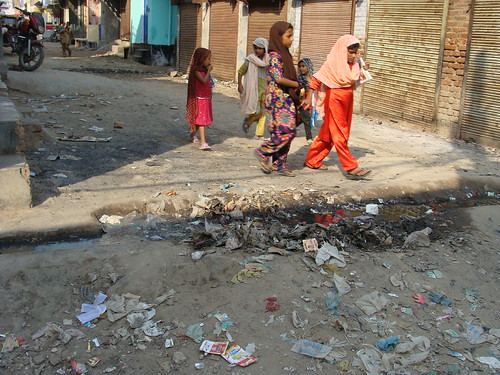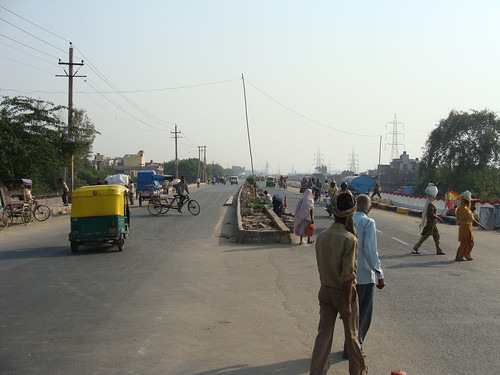By Mumtaz Alam Falahi, TwoCircles.net
New Delhi: If you are a stranger and airdropped in this locality, I am sure you won’t even imagine that you are in the National Capital of India. You will be more surprised when told that you are a few kilometers from the Parliament House and Rashtrapati Bhawan and at equal distance from the Delhi State Assembly House. You are in Kacchi Khajuri, a Muslim-dominated colony in North-East Delhi. The government is spending over Rs 800 crore on infrastructure for Commonwealth Games 2010, just a few kilometres from here, but this locality has been waiting for road and drinking water for over a quarter century.

Kacchi Khajuri is a predominantly Muslim locality in New Delhi, but like many other Muslim-dominated areas in the country, this too is highly neglected in terms of civic amenities, drinking water, roads, schools and hospitals.


People started living here in 1983. Most of them came, and are still coming, from Western Uttar Pradesh and Bihar. They are mostly from labor classes or do small businesses. 25 years on, and they are living without pucca roads and drinking water facility – electricity reached here very recently. With no roads, there is no drainage system, making the area a big drain or pond of garbage in rainy season. Interestingly, the Kacchi Khajuri area, now populated by about 80,000 people (80-90% Muslims), is surrounded by deep long drain from one side and a pond from other side, yet there is no proper drainage system connecting the lanes and bylanes of the locality to the drain or pond.
“Labor class people are living here. Very few have their own businesses. Illiteracy is rampant. Government has shown little interest in this locality. Since the colony came into existence, there has been no drinking water facility. There is no pucca road either. With no drainage system, lanes and bylanes are littered with filth and garbage, causing various diseases among the residents,” says Muhammad Abdullah, Imam, Jama Masjid Tayyeba – the oldest mosque of the colony.


To keep an area clean is certainly the responsibility of a civic body but how the residents as Muslims can shy away from their responsibility to keep their homes and the bylanes clean by sparing an area for garbage rather than letting a heap of garbage piling just in front of their home.
The government here has just two things that it can claim to be its own: a primary school – for an area of 80,000 population, denoting how sincere the State is about education of the largest minority of the country; and a police station, clearly exposing the mindset of the government about the Muslim community — they need no road, no drinking water, no ration shop and no hospital but they surely need a police station.
Yes, besides road and water, Kacchi Khajuri has also no government ration shop and no state-run dispensary or hospital. This is no Bengali-speaking Muslim dominated area over which hovers a cloud of suspicion about their being Indian citizens, and thus door of development is shunted on such areas. They are Hindi-speaking people from Bihar and Uttar Pradesh, genuinely Indian citizens beyond any shred of doubt. They have extended families in their native states. They have election IDs here and cast votes in elections to choose their representatives, religiously. And yet, they are living as second-class citizens.
Economic conditions
Muhammad Abdullah, Imam, Jama Masjid Tayyeba, has been leading prayers in this mosque since 1992. He is paid about Rs 2000 per month by the locals. The mosque, where Friday prayers are also held, is as old as the colony. The mosque isn’t yet complete as it is half covered by roof and the floor out of the roofed area is not even plastered. The Imam is from Gorakhpur in UP.


Meet this boy from Darbhanga in Bihar. He has been living here with his family for over one year. He sells cold water for Re-1 per glass, and thus supports his family.
Muhammad Waris is from Bijnore in UP. He shifted here three years ago. He has six children. He works at a small printing shop.
This is the normal pattern of the socio-economic condition of this locality – either they are laborers or do small businesses.
Educational condition
Though poor, Waris wishes to give good education to his children but fears he can’t. The area with about one lakh population has just one primary school run by Municipal Corporation of Delhi, and no other government school. So, people are forced to send their children to private schools if they can afford, or just drop the idea to educate their children.
“I have four daughters. I want to educate them and make them big people like Indira Gandhi, Sonia Gandhi and Mayawati, but I lack resources. If I could have money I would educate them at good schools, otherwise will drop the idea altogether to educate them,” says Waris.
This is Abdur Rahman from Bijnore. His family is here for over 10 years. The 17-year-old boy Abdur Rahman learns Arabic and Persian at Jama Masjid Tayyeba where a temporary madrasa is run by the masjid committee. He has completed 10th from open schooling system.
There are about 23 mosques in the colony but no formal madrasa or community run school. Yes, some maktabs are being run in some mosques.
One reason for low education rate here is poverty. “People are mostly laborers, and so need earning hands as early as possible and thus very few send their children to school,” says the Imam. After primary schooling, fewer send their children to high school or senior secondary school that are in Pucci Khajuri, a Hindu-dominated area on the other side of the Pushta Road that divides Khajuri Khas area into Kacchi Khajuri and Pucci Khajuri.
A road that divides an area into two – one developed, another backward

Kacchi Khajuri and Pucci Khajuri are part of Khajuri Khas area. The Pushta Road linking Delhi with Uttar Pradesh divides Khajuri Khas into two localities, not only geographically but also development-wise. The Hindu-dominated Pucci Khajuri has all facilities including High Schools. Boys from the dominating community of Gurjars in Pucci Khajuri harass boys and girls from Kacchi Khajuri – the Muslim-dominated area. And here lies the second reason why literacy is low in Kacchi Khajuri.
Pucci Khajuri has Government Boys and Girls Senior Secondary School. It has Government Sarvodaya Boys and Girls School. A deadly stampede at government senior secondary school on September 10 – in which five girls (three Muslims) from Kacchi Khajuri area were killed and scores others injured – has further alienated Kacchi Khajuri residents from Pucci Khajuri. An independent fact-finding team has concluded that the stampede was caused by sexual harassment of girls from Kacchi Khajuri by the boys from Pucci Khajuri. Now the area of victims demands upgradation of the lone government primary school into senior secondary school, at least for girls, at this stage. Otherwise, many have made up mind to withdraw their girls from the school.


On the surface there is no communal tension between the two localities. However, one can feel anger and disappointment in residents of Kacchi Khajuri.
The two colonies came into being almost at the same time but one, dominated by Gurjars, got progress and development very fast while the Muslim area was left to lurch. Besides schools, the Pucci Khajuri area has drinking water facilities, government ration shop, a hospital and pucca roads, leaving Kacchi Khajuri seething with anger. Their women and children have to cross accident-prone Pushta Road to fetch drinking water and ration from Pucci Khajuri. While Pucci Khajuri got status of authorised colony long ago, Kacchi Khajuri got the same only recently.
The ward councilor of the area (Mr Ranbeer) is from Congress while the MLA (Mr Mohan Singh Bisht) – who has more power and grants at his command for developmental work in his area – is a BJP man. When people of Kacchi Khajuri approach the BJP MLA he does not listen to them saying they did not vote for him, say the residents. The area falls in the Karawal Nagar Assembly segment in Northeast Delhi, a minority concentration district, with a population of 17,63,712 (Census 2001). The MP of this Lok Sabha constituency is Mr Jaiprakash Aggarwal, a Congressman.
While the people of Kacchi Khajuri elect their representatives regularly as a religious duty development has so far eluded them. They don’t know how long this will go on.
[Photos: TwoCircles.net]
Slide show:
